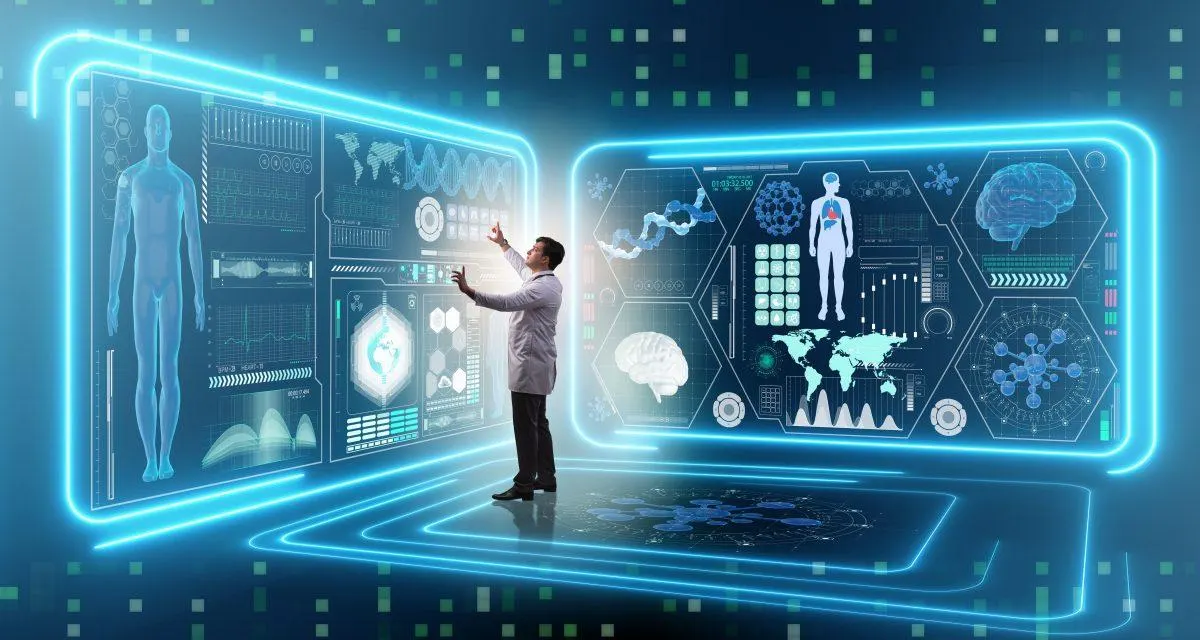AI in Healthcare: How Smart Algorithms Are Saving Lives
In hospitals, it’s always a matter of life and death, and doctors are constantly on the move, making critical decisions around the clock. However, recent innovations in technology, particularly Artificial Intelligence (AI), are rapidly transforming the way care is delivered and managed. Any abnormality or anomaly that might get missed by the human eye can now be detected with the help of AI.
For instance, suppose a mammogram reveals a slight anomaly invisible to the human eye. However, AI, thoroughly analyzing the image with its trained algorithms in thousands of cases, can identify any abnormality that might go undetected by the human eye.
This is just one example of AI usability in healthcare software development. Still, there are multiple other applications of this technology, such as automating administrative workflows, improving diagnostic accuracy, personalizing treatments, optimizing hospital resources, and streamlining clinical documentation. Let us tell you more about how AI technology is revolutionizing the healthcare system, making it more efficient.
Uses of AI in Healthcare: Saving Lives
Artificial Intelligence (AI) in healthcare has made its mark with its innovative applications.
1. Personalized Treatment
With the help of patient data gathered from multiple sources, including wearables, IoT technology, and EHR systems. AI technology can help provide targeted care, such as the development of personalized treatment plans.
● Predictive Analytics
Artificial Intelligence (AI) technology can be used to predict future diseases in patients. Early detection of diseases enables early intervention, saving patients from further complications.
● Personalized Treatment Plans
Another widespread application of AI in healthcare is the efficient analysis of a patient’s genetic data, which aids in the creation of personalized treatment plans. This enables doctors to give customized treatment by understanding the unique genetic makeup of each patient. It also improves outcomes for cancer patients and individuals with rare diseases.
● Drug Discovery
Researchers, with the aid of AI, can analyze vast datasets of chemical and biological information. This capability is crucial for addressing emerging diseases and discovering new treatments.
2. Efficiency in Healthcare Operations
Healthcare is not only about providing care; it involves other aspects such as taking care of administrative tasks, dealing with insurance, preserving medical records, etc. In this regard, AI can be pretty useful by automating tasks, allowing healthcare professionals to focus more on delivering care.
● Resource Allocation
AI aligns the clinical workflow by predicting patient influx, enabling administrators to make informed decisions about staffing, equipment, and bed availability. This allocation of resources saves both time and money for hospitals, ensuring that life-saving interventions are available when required.
● Electronic Health Records (EHRs)
Electronic health records are the digital version of patient information, containing all relevant details. From patient name and contact to history of previous treatments and medications. AI can extract valuable insights from the EHRs, aiding in risk assessment, early intervention, and clinical decision support. This helps healthcare providers offer the most effective and timely care.
● Clinical Workflow Efficiency
AI-based tools developed by any healthcare software development services can increase workflow efficiency by decreasing the time clinicians spend on routine tasks. This technology can assist doctors in automated documentation, faster charting, and the quick retrieval of patient data, allowing them to focus more on patients and less on administrative burdens. This, in turn, helps doctors improve their productivity and enhance the quality of care delivered.
● Automation of Administrative Tasks
Tasks such as appointment scheduling, medical billing, insurance billing, and claims verification can be automated using AI technology. Reducing manual labour, decreasing operational cost, and speeding up the turnaround time. This also frees up the staff to focus on providing the best care.
3. Medical Diagnosis
On the basis of patient data, the AI can detect diseases early before they become dangerous or untreatable. This is effective for early intervention before the condition becomes dangerous for the patients.
● Diagnostic Accuracy
AI diagnostic tools (such as radiology tools) can help improve the speed of diagnosis and also enhance diagnostic accuracy. It helps reduce misdiagnoses and leads to faster identification of diseases.
● Remote Monitoring
AI can also facilitate the continuous tracking of patients’ vital signs and symptoms, which is valuable for individuals with chronic diseases. This constant monitoring can identify early warning signs.
4. Robotic Surgery
This technology plays an essential role in robotic surgery by enhancing precision and control during complex procedures. Robot-assisted surgeries also minimize pain and offer a faster recovery. Some of the notable uses of robotic surgeries include:
- Robot-supported spinal surgery helps in disc replacement, reducing pain and tissue damage.
- Complex heart surgeries can benefit from enhanced precision and reduced trauma.
- Robotic arms can help minimize bleeding during surgery, leading to safer procedures.
Now, let us explain these uses in detail.
● Surgical Precision
AI-based robotic surgery systems enhance surgical precision, enabling surgeons to perform complex procedures with exceptional accuracy. These systems are mostly used in urologic and cardiac surgeries.
● Remote Surgery
There are situations where specialized surgeons might not be physically present. Here, tele-robotic surgeries are of great importance, allowing surgeons to perform procedures from a distance.
5. Data Privacy & Security
AI can detect real-time threats and identify vulnerabilities, preventing data breaches. It can also monitor activity and identify suspicious behaviours, and then help enforce compliance with HIPAA or any other data regulations. Some other methods that are useful in securing data are:
- Robust encryption
- Access control
- Anonymization of patient records
Below are ways AI can help mitigate the issues that arise from non-compliance.
● Sensitive Patient Data
The AI utilization in healthcare makes it necessary for hospitals to handle patient data with care. Moreover, data privacy and security measures (such as HIPAA and GDPR) are necessary to avoid fines or other legal repercussions. Therefore, healthcare software development aligned with strict data protection policies is best suited for securing patient data.
● Patient Data Anonymization
AI is exceptionally useful in supporting patient anonymization by identifying and removing personally identifiable information (PII) from medical records. Additionally, by utilizing natural language processing (NLP), it can scan clinical notes and lab results to identify sensitive details, such as names, dates, or IDs. This also enables the gathering and exchange of data while maintaining robust patient privacy.
Future of AI in Healthcare
In the future, the AI algorithms will not only predict future illnesses but also accurately determine the timing and progression of diseases. This will enable proactive intervention, taking measures before symptoms even appear, leading to the optimization of resources for individuals at high risk.
Moreover, effective communication and interpretation of information can lead to efficient management of resources, ensuring that patients remain informed about their health and do not feel overwhelmed. In a nutshell, AI will facilitate intelligent clinical decision-making and automate complex workflows, resulting in greater collaboration among AI systems, healthcare professionals, and patients. Furthermore, the integration with wearable devices, which facilitates real-time data sharing, can also help improve the timely delivery of life-saving interventions.
Conclusion
Healthcare software development services can aid in the development of AI software that assists doctors in the early detection of diseases. Ease the burden of administrative tasks by automating processes such as data entry, appointment scheduling, billing, summarizing patient history, remote monitoring, and identifying patterns in lab results and patient data. Thus, AI possesses the capability to change the healthcare landscape for the greater good. However, the ineffective implementation of AI in healthcare systems can lead to a lack of interoperability, disruption of healthcare operations, data security risks, regulatory issues, and, not to mention, the introduction of unnecessary bias.






